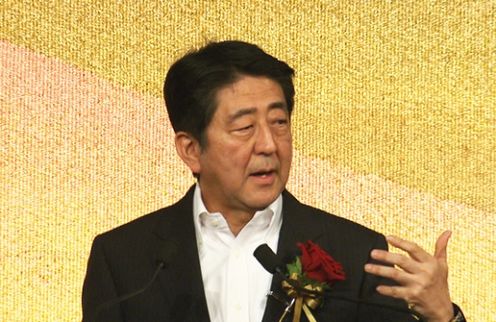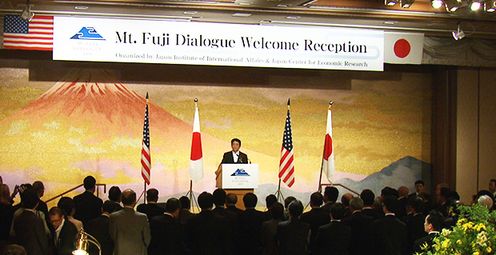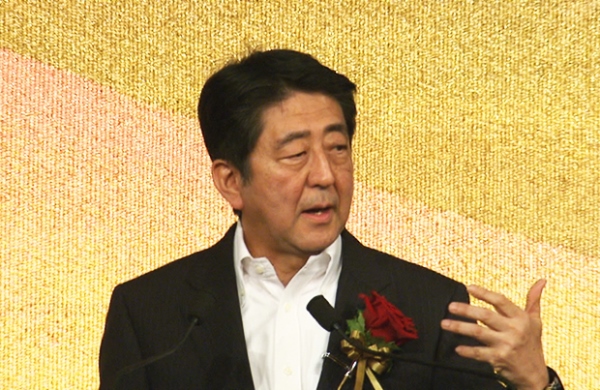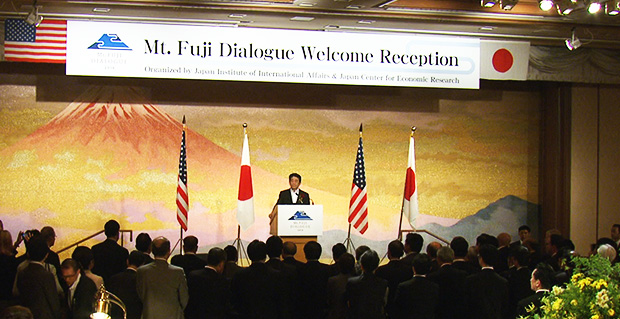Home > News > The Prime Minister in Action > June 2016 > Mt. Fuji Dialogue Welcome Reception
The Prime Minister in Action
Mt. Fuji Dialogue Welcome Reception
June 3, 2016

Photograph of the Prime Minister delivering an address (1)

Photograph of the Prime Minister delivering an address (2)
[Provisional Translation]
Prime Minister Shinzo Abe attended the Mt. Fuji Dialogue Welcome Reception held in Tokyo.
In his speech, the Prime Minister said,
“I wish to express my sincere joy at seeing the third Mt. Fuji Dialogue held with such grandeur and the attendance of so many eminent persons, including many people from the United States. I would also like to express my respect for the extremely robust debate you have undertaken on the future of the Japan-US relationship over the first, second, and now third meeting.
I attended the first meeting two years ago, but was unable to fit the second meeting last year into my schedule, no matter how I tried. Now we are at the third meeting. I believe that the past year has actually been an extremely important year for Japan-US relations. For example, last year I visited the United States and became the first Prime Minister from Japan to give an address at a joint meeting of the U.S. Congress. That event was the result of the cooperation of many people, including related parties from the United States who are in attendance today. In my speech, I stated that Japan and the United States must maintain an ‘Alliance of Hope’ that jointly addresses the various issues facing the world.
Sometime after that, I issued a statement on the occasion of the 70th year since World War II. Following that, the Legislation for Peace and Security was formulated. That was quite difficult. However, according to current public opinion surveys more and more people are disagreeing when presented with the statement that we should repeal the Legislation for Peace and Security. Diet member Akihisa Nagashima, who is with us today, opposed this legislation with his party, but I imagine he would also secretly say that it should not be repealed if asked during a public opinion survey phone call.
Through this legislation, our alliance is now one in which Japan and the United States can assist each other to protect Japan. When North Korea launched ballistic missiles this year, Japan and the United States were able to work more closely than ever before in our response. Admiral Harry B. Harris, Jr., Commander of the U.S. Pacific Command, said as well that the United States and Japan collaborated even more closely than ever before. I am confident that this is proof that an alliance in which each side can provide assistance to the other in order to defend Japan has strengthened our bonds of friendship.
Moreover, during the recently held G7 Ise-Shima Summit, I believe that Japan and the United States led the meeting to success through our cooperation on various issues. In the field of economics, the G7 shared the view that we would take all appropriate policy responses in a timely manner to avoid falling into another crisis, and we made that clear in the Leaders’ Declaration. Japan holds a position of responsibility to lead discussion on this. I want to further accelerate thorough structural reforms and take all possible measures, including fiscal stimulus. To that end, we have just made the decision to postpone the increase in the consumption tax that was planned for April of next year for another two and a half years.
As the Summit was held in Japan, we discussed the current state of the South China Sea. During that meeting I gave detailed explanations on the security situation and unilateral attempts to change the status quo. We reached an agreement on three principles, namely, that states should make and clarify their claims based on international law, not use force or coercion in trying to drive their claims, and seek to settle disputes by peaceful means. I want Japan and the United States to cooperate in accordance with these three principles to protect the freedom of navigation and overflight, and facilitate the rule of law, thereby contributing to regional peace, safety, and prosperity.
After the Summit, I visited Hiroshima together with President Obama. Together, we offered our sincere condolences for those who lost their precious lives due to the atomic bombs. The President of the only country in the world to have used an atomic bomb and the Prime Minister of Japan, the only country in the world to have suffered an atomic bombing during wartime, offered their sincere condolences together, and pledged that we would combine our efforts for the realization of a world without nuclear weapons. Japan and the United States, enemies that had fought each other so fiercely 71 years ago have become friends bonded in spirit..
I intend to continue to work hand in hand with the United States, and to jointly contribute to resolving the various global issues we face and achieving regional prosperity and world peace. I wish to close my remarks by expressing my hope that the Mt. Fuji Dialogue will continue to play a role in the further enhancement of the Japan-US Alliance, an ‘Alliance of Hope.’”


